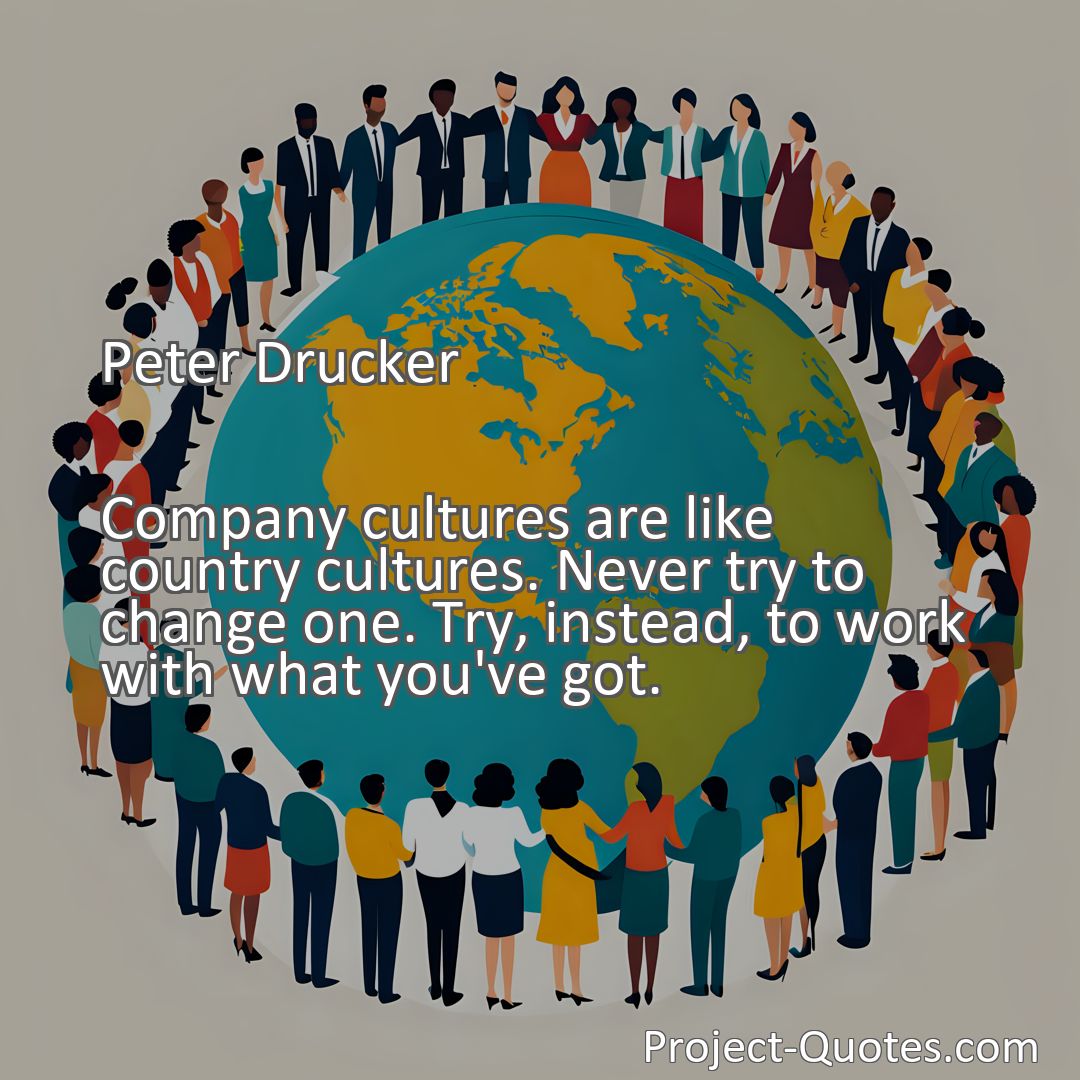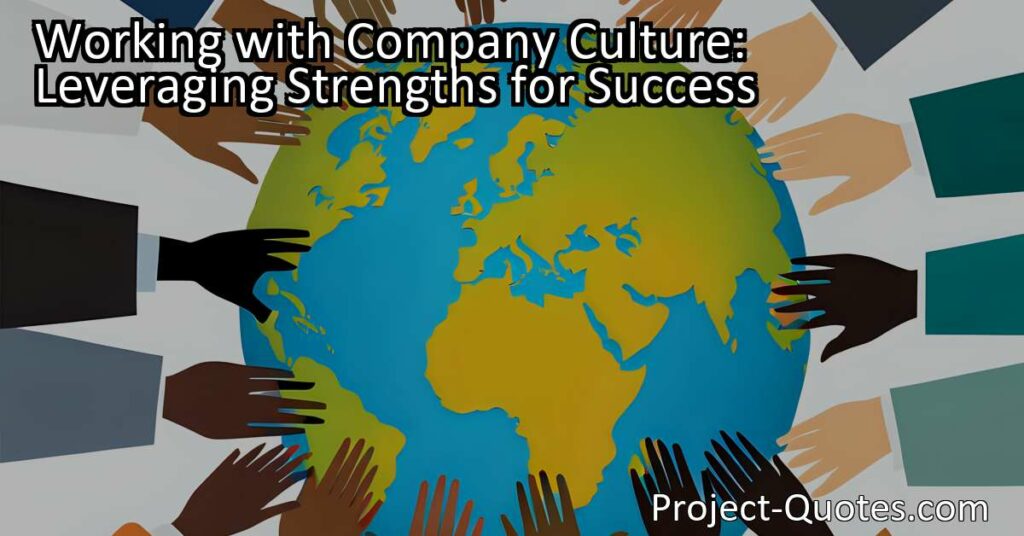Company cultures are like country cultures. Never try to change one. Try, instead, to work with what you’ve got.
Peter Drucker
Working with Company Culture: Leveraging Strengths for Success Instead of trying to change a company’s culture, it is more effective to work with it and leverage its strengths. By understanding and embracing the existing cultural dynamics within an organization, leaders can promote inclusivity, stability, and improvement, ultimately fostering a productive and successful work environment.
Table of Contents
- 1 Company cultures are like country cultures. Never try to change one. Try, instead, to work with what you’ve got.
- 2 Peter Drucker
- 3 Meaning of Quote – Company cultures are like country cultures. Never try to change one. Try, instead, to work with what you’ve got.
- 4 Freely Shareable Quote Image
- 5 Related
Meaning of Quote – Company cultures are like country cultures. Never try to change one. Try, instead, to work with what you’ve got.
Company cultures are like country cultures. Never try to change one. Try, instead, to work with what you’ve got. This quote, attributed to Peter Drucker, a well-known management consultant, highlights the importance of understanding and adapting to the existing culture within an organization rather than attempting to impose drastic changes. Just as each country has its unique traditions, customs, and values, each company has its distinct set of norms, behaviors, and beliefs that shape its culture. To create a harmonious and successful work environment, it is essential to navigate and align with these existing cultural elements.
In today’s globalized world, organizations operate in increasingly diverse settings. They may have employees from different backgrounds, nationalities, and experiences. Thus, recognizing and appreciating the diversity within a company’s culture becomes crucial. Like a woven tapestry, a company’s culture is a combination of various threads that represent the individual perspectives, beliefs, and values of its employees. Attempting to change this intricate fabric entirely may lead to resistance, disharmony, and inefficiency.
Instead of trying to change the existing company culture, it is wiser to work with it and find ways to leverage its strengths. An organization’s culture is the glue that holds its employees together, drives their behavior, and shapes their performance. By understanding the existing cultural dynamics, leaders can identify areas of improvement and build upon the positive aspects that contribute to the company’s success.
One of the primary benefits of embracing and working with the existing culture is the opportunity to harness employees’ collective potential. Each organization’s culture has unique aspects that influence how employees collaborate and interact with each other. By not trying to drastically change these dynamics, leaders can build on the existing relationships and allow employees to leverage their strengths to achieve common goals.
Moreover, working with the company’s existing culture promotes a sense of belonging and inclusivity. When individuals feel valued and appreciated for who they are, they are more motivated and engaged in their work. By acknowledging and respecting the cultural diversity within the organization, leaders foster an environment where everyone feels comfortable expressing their ideas and perspectives. This inclusivity can lead to increased creativity, innovation, and problem-solving abilities, positively impacting the company’s overall performance.
Another advantage of working with the existing company culture is that it promotes stability and consistency. Change can create a sense of uncertainty and anxiety among employees. However, by building upon the foundations of the existing culture, leaders can introduce gradual, meaningful changes while maintaining a sense of stability. This approach helps employees adapt to new practices and procedures more easily, reducing resistance and increasing their overall acceptance of change.
Furthermore, working with the existing culture allows leaders to identify areas of improvement and address any potential issues. By observing and understanding the prevailing cultural norms, leaders gain insights into what is working well and what needs to be refined. They can identify any gaps in communication, decision-making, or collaboration and implement targeted strategies to bridge these gaps. By doing so, leaders can create a more cohesive and efficient work environment where employees feel heard, valued, and respected.
While it is essential to work with the existing culture, there may be instances where certain aspects of the culture need adjustment to align with the organization’s values and vision. In such cases, leaders can focus on nurturing a culture of openness and continuous improvement. By fostering a culture that values adaptability and growth, leaders can encourage employees to embrace change and willingly adjust certain cultural elements to ensure alignment with the company’s evolving goals.
Given the critical role of company culture in driving organizational performance, it is essential for leaders to invest time and effort in understanding and working with it. Conducting cultural assessments and obtaining feedback from employees can provide valuable insights into the prevailing cultural dynamics. By involving employees in the process, leaders can encourage collaboration and empower individuals to take ownership of their culture, fostering a sense of collective responsibility.
In conclusion, just as each country has its unique culture, each company also possesses its distinct cultural identity. Attempting to change a company’s culture entirely can be counterproductive and may result in resistance and disharmony. It is far more beneficial to work with the existing culture, leveraging its strengths and building upon them. By doing so, leaders can create an inclusive work environment where employees feel valued and motivated, promote stability and consistency, and identify areas of improvement to enhance overall performance. Embracing and working with the existing company culture is key to nurturing a productive, collaborative, and successful organization.
I hope this quote inspired image brings you hope and peace. Share it with someone who needs it today!


